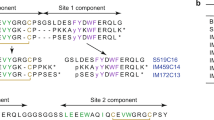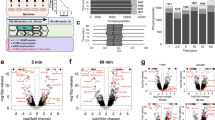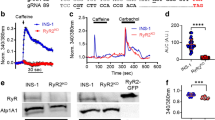Abstract
The binding of insulin to its receptor initiates multiple signal transduction pathways regulating such diverse processes as proliferation, differentiation, glucose transport, and glycogen metabolism. The STAT-family of transcription factors has been demonstrated to play a critical role in gene induction by a variety of hemopoietic cytokines and hormones. Furthermore, constitutive activation of STATs is observed in transformed cells. Here we describe activation of a transcriptional complex binding to a consensus STAT-transcriptional element in response to insulin challenge. This complex is induced rapidly after tyrosine autophosphorylation of the insulin receptor, and is sustained for several hours. Supershift analysis of the insulin-induced complex reveals that it specifically contains the transcription factor Stat3. DAN binding of this complex is inhibited by pre-incubation with tyrosine, but not serine/threonine protein kinase inhibitors, whereas transcriptional activation is inhibited by both. Utilising a dominant negative mutant of p21ras we demonstrate that both insulin-induced Stat3 DNA-binding and also transactivation do not require p21ras. Furthermore, although previous studies have suggested a role for MAP kinases (ERKs) and PI-3K in STAT activation, utilising the specific MEK inhibitor PD098059 and the PI-3K inhibitor wortmannin, we demonstrate that activation of ERKs or PI-3K are not required for insulin induced Stat3 phosphorylation or transactivation.
This is a preview of subscription content, access via your institution
Access options
Subscribe to this journal
Receive 50 print issues and online access
$259.00 per year
only $5.18 per issue
Buy this article
- Purchase on SpringerLink
- Instant access to full article PDF
Prices may be subject to local taxes which are calculated during checkout
Similar content being viewed by others
Author information
Authors and Affiliations
Rights and permissions
About this article
Cite this article
Coffer, P., van Puijenbroek, A., Burgering, B. et al. Insulin activates Stat3 independently of p21ras-ERK and PI-3K signal transduction. Oncogene 15, 2529–2539 (1997). https://doi.org/10.1038/sj.onc.1201429
Received:
Revised:
Accepted:
Issue date:
DOI: https://doi.org/10.1038/sj.onc.1201429
Keywords
This article is cited by
-
Dipeptidyl peptidase-4 is associated with myogenesis in patients with adolescent idiopathic scoliosis possibly via mediation of insulin sensitivity
Journal of Orthopaedic Surgery and Research (2022)
-
Insulin/IGF-1 signaling promotes immunosuppression via the STAT3 pathway: impact on the aging process and age-related diseases
Inflammation Research (2021)
-
Pregnancy-associated plasma protein (PAPP)-A expressed in the mammary gland controls epithelial cell proliferation and differentiation
Endocrine (2013)
-
Amyloid-β causes memory impairment by disturbing the JAK2/STAT3 axis in hippocampal neurons
Molecular Psychiatry (2009)
-
Insulin down-regulates resistin mRNA through the synthesis of protein(s) that could accelerate the degradation of resistin mRNA in 3T3-L1 adipocytes
Diabetologia (2003)



